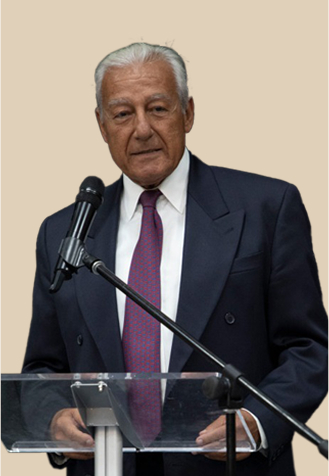“The misadventures of neoconservatives”

April 15, 2003
By Ali Abunimah and Hussein Ibish
As the war in Iraq moves toward its conclusion, neoconservatives in and around the Bush administration are beginning to aggressively push a chilling agenda for a generalized war against much of the Arab and Islamic worlds.
This program to deliberately unleash a calamitous “clash of civilizations” must be urgently confronted before it succeeds in plunging us into a cycle of uncontrolled chaos and confrontation.
Former CIA Director James Woolsey illustrated how extreme this vision really is when he recently told a group of California college students that the United States is engaged in fighting “World War IV,” which will “last considerably longer than either World Wars I or II,” but hopefully not as long as the Cold War.
The enemies in this war, which he unconvincingly presented as a campaign for democracy, are the rulers of Iran, the “fascist” rulers of Iraq and Syria and groups like Al Qaeda.
Woolsey also singled out the pro-American rulers of Egypt and Saudi Arabia, declaring “We want you nervous. We want you to realize now, for the fourth time in 100 years, this country and its allies are on the march and that we are on the side of those whom you–the [Egyptian President Hosni] Mubaraks, the Saudi royal family–most fear. We’re on the side of your people.”
Norman Podhoretz, editor-at-large of Commentary magazine, who was the first to dub the project World War IV, and other neoconservatives, openly call for “regime change” in a whole list of Middle Eastern states, governed by both pro- and anti-American regimes.
For Podhoretz, the global extremism, chaos and violence that the war on Iraq may provoke are not the undesirable side effects of a noble mission, but the necessary pretext for more aggressive American intervention. He says that the U.S. can “win” this war and “reform” Islam provided that America has “the stomach to impose a new political culture on the defeated parties.”
Neoconservatives long have been demanding an attack on Iraq as the first step in a far more ambitious regional and global agenda, but for the past decade made little headway with the rest of the foreign policy establishment.
A 2000 report from the neocon think tank, the Project for a New American Century, co-authored by several key members of the Bush administration, laid out the vision of a world order completely dominated by unilateral American power. It also lamented that, due to opposition from more responsible elements in government, their hyper-aggressive agenda would have to be advanced slowly, “absent some catastrophic and catalyzing event like a new Pearl Harbor.”
Playing exactly that role, the Sept. 11 attacks opened the political space necessary for the attack on Iraq, promoted mainly through the theory that Iraq might one day supply chemical or biological weapons to terrorists.
Many Americans reluctantly supported the attack on Iraq because they truly believed that it would make America safer and Iraqis freer.
Precious few have willingly signed up for a new, catastrophic and completely unnecessary global confrontation with Islam.
An increasing number of more sober voices are speaking out against this recklessness.
A full scale civil war on the right over foreign policy has broken out in the press, with conservative icons such as columnist Robert Novak trading bitter accusations with overwrought neocons like David Frum, author of the irresponsible “axis of evil” speech.
Stalwarts of the first Bush administration such as former Seretary of State James Baker, former National Security Adviser Brent Scowcroft and former Secretary of State Lawrence Eagleburger have been openly trying to steer President Bush away from what one unnamed former senior official called “this bum advice he has been getting” from neocons. Another observed that “The only one who can reach the president is his father but it is not timely yet to talk to him,” indicating a plan for a protracted campaign. They have obvious potential allies in the Cabinet such as Secretary of State Colin Powell and National Security Adviser Condoleezza Rice.
Liberals are also joining the fray, with Sen. John Kerry (D-Mass.) leading the call for “a vision of the world that is very different from what these excessively ideological unilateralists want to thrust on us.”
These voices of reason need to be encouraged and emboldened.
President Bush has insisted that U.S. troops will not stay in Iraq any longer than necessary. The question is, necessary for what? The Pentagon intends to rule Iraq directly for the meanwhile, and no plans exist for any election or representative government.
Among those slated for senior positions in Iraq is James Woolsey. Woolsey’s latest statements, and continued ambiguity about long-term American intentions in the region, can only fuel fears that neoconservatives in the administration intend not to give Iraq back to its people as soon as possible, but to use it as a launching pad for further adventures that may truly plunge us all into World War IV.
Ali Abunimah is co-founder of electronicIraq.net and Hussein Ibish is communications director for the American-Arab Anti-Discrimination Committee
Recent Posts
Action Alerts

Your support means everything. Your gift protects rights, builds community, and fights hate. Let’s move forward together.
